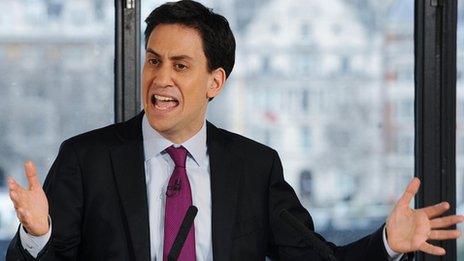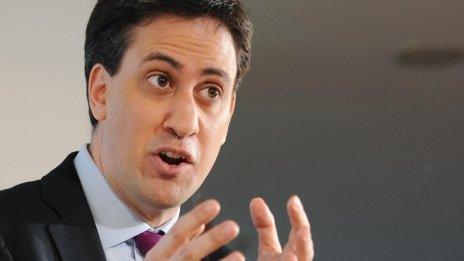Labour - Now Ed backs pay cuts
- Published
- comments
The Labour leader is urging public sector workers to be prepared to take cuts in their own pay if needed to save their jobs.
His own local Labour-controlled council in Doncaster decided last week to cut pay by 4% for staff earning £15,000 or more, excluding those who work in schools. The council said it would save between 200 and 250 jobs.
I was speaking to Ed Miliband after he was attacked by the leaders of two major unions - Unite and the GMB - for his earlier announcement that Labour would back government plans to cap public sector pay.
Here's a transcript of parts of the interview.
ED MILIBAND: "...Prioritise jobs over pay. You know it's happening in businesses all round this country Nick. Employers working with unions often, are making those difficult decisions to say 'well we're going to have lower pay rises, we're going to have a stall in pay to protect the workforce'. That's what people are experiencing, that's what local councils are doing, we're facing up..."
INTERRUPTION FROM ROBINSON: "Would you say to public sector workers to do more of that..."
MILIBAND: "Absolutely ....." (talking over Nick)
ROBINSON: "Would you urge public sector workers to agree to pay cuts to save jobs?"
MILIBAND: "Well we're talking, actually about a pay increase limited to 1%, but absolutely. Look, the priority now has to be to preserve jobs. I think that's a recognition that everybody would see all round the country. We have got to do everything we can to preserve employment and as I say, this Labour Party is going to face up to those difficult choices we have to make."
ROBINSON: "Just on that, are you saying you could even go further, that if workers think it's right, and unions think it's right, Labour thinks it's right, to cut wages if it saves jobs in the public sector?"
MILIBAND: "That's all about the negotiations that are taking place - in the private sector, in the public sector, there are these negotiations going on.
"But the priority is this - face up to the tough choices which the Labour Party is doing and do everything you can to keep jobs because I think that's the priority. And you've got a government that's actually making decisions which means unemployment is being driven higher and in those circumstances, for us to do anything else would be irresponsible."
Before today Ed Miliband has refused to back or oppose his local council saying it was properly a matter for them.
In the same interview he insists that Labour's policy is not confused - they are committed to fight cuts that are too far and too fast now, whilst being realistic about the fact that they cannot promise to reverse any of them before they can find the money to do so.
UPDATE 1745:
One telling moment when I interviewed Ed Miliband was his answer to the question: is this (economic) policy new?
His face betrayed that he wasn't sure whether to say yes or no. His aides have been spinning his message as that of a changed party with a new message. He, on the other hand, told me the policy was not new.
Here are the other key parts of Miliband interview:
ON FIGHT WITH THE UNIONS
QUESTION: "Some claimed that you got your job because of the unions, are you relishing the chance to prove them wrong?"
ANSWER: "I don't seek a fight within my own party but I do stand up for what's right and if people don't like it, I'm afraid that's tough because I'm going to take the responsible path, the right path and the path which will show to the public that Labour is serious about the economic reality we will face, if we come into government after the next general election."
ON ECONOMIC POLICY
QUESTION: "In simple terms, are you saying: 'Yes we still oppose cuts now but no we won't carrying on opposing them after they're made because there's no money around?'"
ANSWER: "No, what we're saying is that we oppose the cuts now but it would be irresponsible three years from a general election for us to start making specific promises about what cuts we would reverse. And I tell you this Nick, I am only going to make promises about what cuts I can change if, at the election, I can specifically show where the money would come from. That's the right approach, it's the responsible approach and that's the approach I think the British people would expect from the Labour Party."
QUESTION: "Some people think this is curious because it gives you an excuse to say: 'Well we oppose this cut', only to say a few weeks later, 'actually we back it, we've got to live with it'."
ANSWER: "No, it's not about backing the cuts that are being made. We don't want these cuts to be being made. It's not in the interests, for example, of safety on our streets to be having the speed of cuts we're seeing in policing. Or in the interests of the economy to have the overall pace of cuts - that's why we say too far and too fast.
"But given the way the government is going and given that they are racking up bigger and bigger bills to pay for unemployment, people being out of work claiming benefits not in work paying taxes - if I was to say to you now: 'I'm going to reverse those cuts, I can promise you Nick that I'll reverse those cuts in three-and-a-half years time,' you'd rightly say to me, 'Well, where's the money going to come from? How are you sure you can do that?'
"I'm not going to make promises I can not keep. That is the first rule of the Labour Party under me."
UPDATE 1910
Some are expressing surprise at the idea that the Labour leader is prepared to see pay cuts to save jobs, but it's worth noting that today's shadow cabinet discussed examples of councils in which this had happened - not just Labour-controlled Doncaster, but Tory-run Blackpool too.
It's clear that Ed Miliband didn't set out today to open up a new front in his argument with the unions by calling for pay cuts - as a fuller transcript of our exchange on this issue makes clear. However, one of his aides confirmed to me this afternoon that the Labour leader is happy to see pay cuts if they save jobs.
MILIBAND: You know it's happening in businesses all round this country, Nick. Employers working with unions often are making those difficult decisions to say 'Well, we're going to have lower pay rises. We're going to have a stall in pay to protect the workforce'. That's what people are experiencing. That's what local councils are doing, we're facing up …
QUESTION: (Interruption) Would you say to public sector workers to do more of that...
MILIBAND: Absolutely ..... (talking over Nick)
QUESTION: Would you urge public sector workers to agree to pay cuts to save jobs?
MILIBAND: Well, we're talking actually about a pay increase limited to 1%, but absolutely. Look, the priority now has to be to preserve jobs. I think that's a recognition that everybody would see all round the country. We have got to do everything we can to preserve employment and as I say, this Labour Party is going to face up to those difficult choices we have to make.
QUESTION: Just on that, are you saying you could even go further, that if workers think it's right, and unions think it's right, Labour thinks it's right, to cut wages if it saves jobs in the public sector?
MILIBAND: That's all about the negotiations that are taking place - in the private sector, in the public sector, there are these negotiations going on. But the priority is this: face up to the tough choices which the Labour Party is doing and do everything you can to keep jobs, because I think that's the priority. And you've got a government that's actually making decisions which means unemployment is a being driven higher and in those circumstances, us to do anything else would be irresponsible.
- Published17 January 2012

- Published15 January 2012
